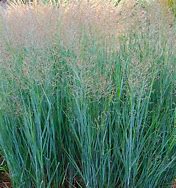Grass Panicum Heavy Metal
$17.99
Panicum virgatum, 'Heavy Metal', also known as Switch Grass is a Missouri native ornamental grass which was an important component of the tallgrass prairie which once covered large areas of the State. It occurs in both wet and dry soils in prairies and open woods, gravel bars and stream banks and along railroad tracks throughout most of the State. Switch grass is generally noted for its stiff, columnar form, and typically retains its vertical shape throughout the growing season. It is a clump-forming, warm season grass which typically grows to 3' tall. When in flower, flower panicles may bring total plant height to 6'. Features medium green leaves which turn yellow (sometimes with orange tints) in autumn, fading to tan-beige in winter. Foliage clump is topped in mid-summer by finely-textured, pink-tinged, branched flower panicles which hover over the foliage like an airy cloud. Panicles turn beige as the seeds mature in fall with the seed plumes persisting well into winter. Seeds are a food source for birds in winter.
Heavy Metal, or switch grass, is Easily grown in average, medium to wet soils in full sun to part shade. Tolerates a wide range of soils, including dry ones, but prefers moist, sandy or clay soils. Tolerates occasional flooding. May flop in overly rich soils. Generally performs best in full sun. Will grow in part shade, but begins to lose its form in too much shade, growing more openly and possibly falling over. Grows primarily in clumps, but will slowly spread by slightly creeping rhizomes. Cut back clumps to the ground in late winter to early spring. Plants may self-seed in optimum growing conditions but cultivars may not come true from seed.
Zone: 5 to 9
Height: 4.00 to 5.00 feet
Spread: 1.00 to 2.00 feet
Bloom Time: July to February
Bloom Description: Pink-tinged
Sun: Full sun to part shade
Water: Medium to wet
Maintenance: Low
Suggested Use: Rain Garden
Flower: Showy, Good Cut, Good Dried
Leaf: Colorful, Good Fall
Attracts: Birds
Other: Winter Interest
Tolerates: Drought, Erosion, Dry Soil, Wet Soil, Black Walnut Acidic Soil, and Air Pollution
Additional information
Out of stock

